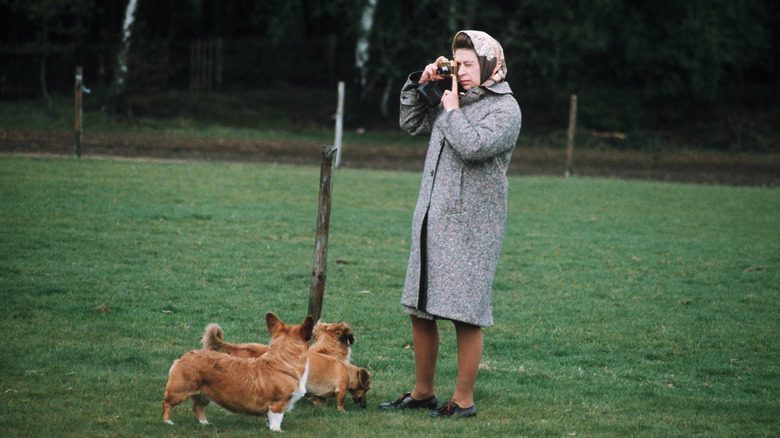Dog Expert Shares Crushing News About The Queen's Corgis After Her Death
Queen Elizabeth II was a passionate dog lover. She had become synonymous with the corgi, having helped launch the breed into popularity, according to the BBC. Her love for the adorable pups started at 7 years old when she fell in love with the breed and wanted one of her own. While corgis were popular in Wales at the time, they had yet to make waves in the queen's native London. However, young Elizabeth got two puppies from a breeder and the rest was history.
Throughout the rest of her life, Queen Elizabeth had 30 corgis and corgi-dachshund mixes, called "dorgis," (via People). Her loyal companions were well cared for throughout their lives.
She loved the breed so much that during her Platinum Jubilee celebrations, the world got to witness the first-ever corgi derby! At the time of her death, she had four dogs — one dorgi, one cocker spaniel, and two corgis. A dog expert recently weighed in that her beloved pups may be deeply grieving the late monarch.
The queen's corgis could be mourning her loss
Following the death of Queen Elizabeth II, royal fans were concerned about what would happen to her beloved dogs. A fan even asked William, the Prince of Wales, about the well-being of the dogs outside Westminster Abbey, NBC's "Today" reports. "I saw them the other day, that got me quite sad," he told the fan. "They are going to be looked after fine."
However, dog expert John Smith told the Daily Mail that the queen's beloved corgis may be deeply mourning the loss of their owner. While they do not grieve as humans do, they certainly can feel a loss.
"These feelings can lend themselves to common and often devastating symptoms, such as whining, pacing, howling, loss of appetite, fidgeting, broken sleep patterns, anxiety, and lethargy," Smith said. "The corgis won't fully understand the extent of the queen's death, but they are very intuitive and will understand the emotion of missing someone that's no longer there."
He added that the corgis can feel depressed, but that much like humans, they will adapt with time.

